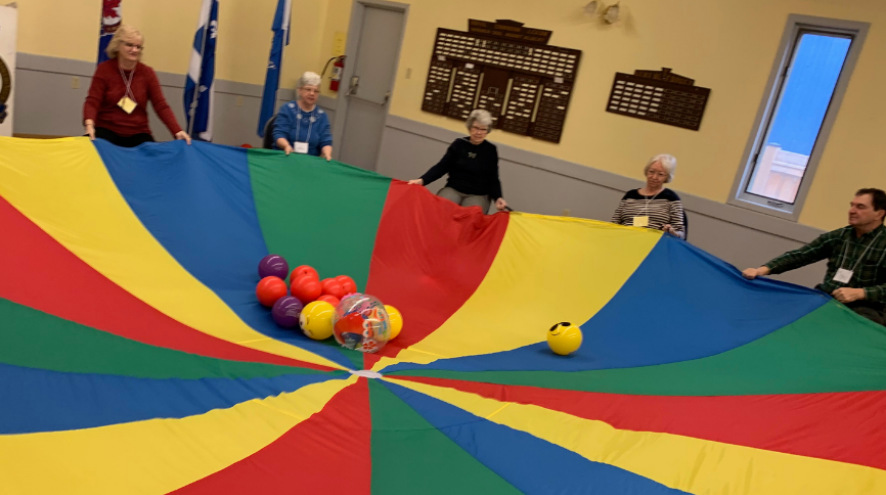Minds in Motion®
Minds in Motion is a program for people diagnosed with early to mid-stage dementia and their care partners, offering mental and social stimulation and physical activity.

Participants take part in a ball game at an in-person Minds in Motion program. The program is now virtual.
To learn more, contact Jennifer Barta, Minds in Motion coordinator
- Phone: 905-726-3477
- Email: [email protected]
Or Jaime Cruz, public education coordinator/Minds in Motion Coordinator, at [email protected]
Classes are ongoing. Join any time.
A giant thank you to Catherine Booth and Michael Kirk, friends and family of Tarik and Feroze Mohammed and Alzheimer Society of Ontario for funding this program for people living with early to mid-stage dementia and their care partners.
What is Minds in Motion
Minds in Motion is a program for people diagnosed with early to mid-stage dementia and their caregivers to do together.
Combining 30 minutes of physical activity and 30 minutes of cognitive stimulation, Minds in Motion unfolds to laughter and chatter, with new friendships forming and stories being shared.
Feedback from our participants:
"Well done, Jaime. Very well planned, offering an appropriate mix of gentle exercise, easy communication and participation from all involved. This is a fabulous opportunity for dad to engage in a stimulating program while still safe, secure and comfortable at home. So very happy to be a part of this. Keep up the good work; looking forward to next week’s workshop." - Care partner
“The people involved are the most helpful. Pleasant and understanding- it’s been a very worthwhile course.” - Person with Dementia
Participants
- Minds in Motion participants with early to mid-stage dementia and are accompanied by their care partners.
- A maximum of 11 couples, or 22 participants, enrolled in each eight-week program
- Each pair pays a registration fee.
The program
The two-hour program runs once a week for eight weeks, in a community-based program centre, and offers:
- Gentle and easy-to-follow physical activities
- Social activities focused on building personal and communication skills.
- Mental stimulation to rekindle memories.
- Socialization opportunities to build connections
The program benefits
For the person with dementia:
- Improved balance, mobility, flexibility and alertness
- Increased confidence and comfort with their own circumstance
- Mutual support from others facing similar experiences
For care partners:
- Provides an opportunity for caregivers to focus on their own health and have fun with their partner.
- Seeing the person they are caring for enjoying themselves
- Mutual support and learning from other care partners
All participants can benefit from:
- Sharpened mental functioning, sometimes lasting two to three days
- Increased sense of social participation
Pilot Findings
- Participants’ endurance improved by 20 per cent and strength by 15 per cent
- Participants reported decreased social isolation and an increase in informal networks of support
- 79 per cent of participants continue with physical and social programs after participating
- More than 100 volunteers and students have been trained and are active in program delivery
- 90 per cent of staff, volunteers and students identified an increase in their dementia knowledge
